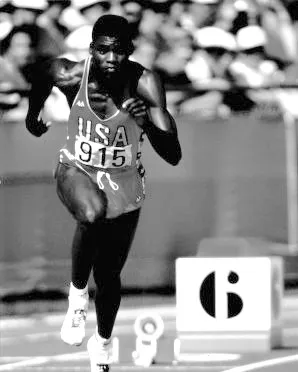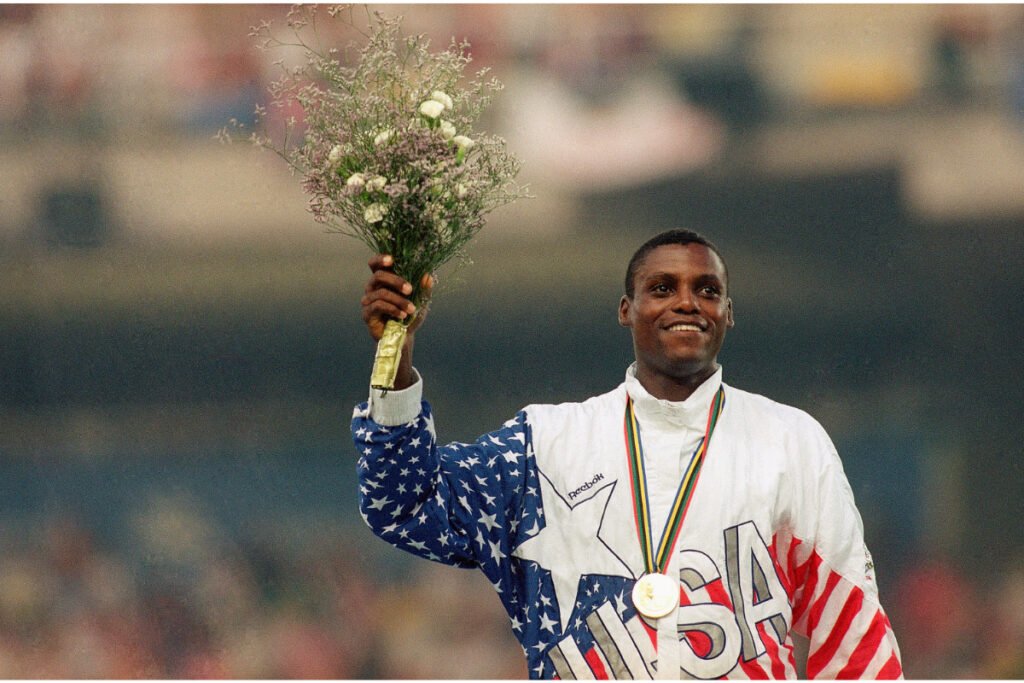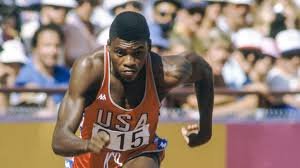A Titan of Athletics: From Humble Beginnings to Unmatched Glory
Carl Lewis is the ringside bell that conjures the essence of supremacy, par excellence in athletic brilliance, supreme over all time as the most outstanding track and field athlete. Over two decades of his career are an adamant testimony to unbending dedication, extraordinary talent, and an unrelenting pursuit of victory. This paper looks at Lewis’s remarkable journey from when he first stepped onto a track to his lasting legacy.

Early Spark: A Dream Ignited
Carl Lewis was born in Birmingham, Alabama, on July 1, 1961, destined to become a legend. He came under the influence of Jesse Owens, but Lewis seemed to be theatrically talented since childhood. He had his secondary education at Willingboro High School in New Jersey, after which he dominated District and State Championships in sprinting and long jump events. That was what made this particular natural talent and competitive spirit unique. His exceptional abilities earned him a scholarship at the University of Houston, where he would sharpen his abilities under the renowned coach Tom Tellez. Tellez’s meticulous training methods and rigour in emphasizing technique would lie at the core of shaping Lewis into the world-beating athlete he was to be.
A Reign of Glory: Golden Moments on the World Stage
The 1980 Moscow Olympics, a potential launching pad for Lewis’s career, produced a defining moment. The United States boycotted the Games in protest of the Soviet invasion of Afghanistan, leaving a young Lewis with a hunger for the chance to compete at the highest stage. His wait wouldn’t be long, though.
The 1984 Los Angeles Olympics launched Lewis onto the global stage. He engraved his name in history by completing the “Golden Slam.” He won gold medals in 100m, with 9.99 seconds; the 200m, in 19.80 seconds; the long jump, with a distance of 8.54 meters; and lastly, the 4x100m relay with the help of the American team. For all practical purposes, this equalled Jesse Owens’s Berlin performance in the 1936 Olympics, thus confirming that Carl Lewis was indeed the successor to the throne of athletics.
The next few years were all about Lewis’s domination. He defended his 100m (after Ben Johnson’s disqualification) and long jump titles at the 1988 Seoul Olympics, proving his consistency. But he could do little about accepting the silver medal in the 200m, proving once again that even legends may be challenged.
At the 1992 Barcelona Olympics, Carl Lewis further etched his name in Olympic history. He won a third consecutive gold medal in the long jump, an achievement no one had managed before. He also made an anchor-leg victory in the US 4x100m relay team, establishing a world record at 37.40 seconds.
Surprisingly, Lewis’s Olympic performance came full circle. At age 35, during the 1996 Atlanta Olympics, most thought him too old to perform. But by sheer will, he squeezed into the long jump and took home his ninth Olympic gold medal, breaking the record previously shared with Finnish runner Paavo Nurmi. This cemented Lewis’s status as an intergenerational legend.

A Stellar Track Record: Records and Unprecedented Achievements
Lewis’s impact on the sport extends far beyond Olympic glory. He has a total of nine Olympic golds, one Olympic silver, eight World Championship golds, and two World Championship silvers. His list of record-breaking achievements continues to inspire athletes everywhere.
World Records:
100m – 9.86 seconds, set in 1991
Long Jump – 8.95 meters, set in 1991 – this record still stands today
4x100m relay — 37.40 seconds (1992, as a member of the American team)
Indoor track and field records, many of them.
Now many of the groundbreaking achievements that further manifested Lewis’s longevity and unequalled dominance were evidenced by the fact that he stands alone as the only athlete to win the long jump at four consecutive Olympic Games. He was one of six to have managed a gold medal in the same individual event in four consecutive Olympics. At one time, he held the top ten long jump distances in the world, again evidencing his unmatched consistency.
Confronting the Dark Side: Doping Allegations and Controversy
Not to belittle his undeniably great success, Lewis’s career was not free from controversy. Doping suspicions followed Lewis throughout his career because of his very long reign and because of some of the training methods used by his coach, Tom Tellez, who was later linked to doping scandals. Lewis himself never failed any drug tests during the years of active competition, however. The accusations are, therefore, very hard to either prove or refute because of the lack of hard evidence.
False starts and sporting behaviour: Carl Lewis often disqualified himself at the starting block for false starts. While some viewed it as a clever ploy to retreat from an event in which he was facing stiff competition, others viewed this as a lack of composure and later questioned his sportsmanship.
Dominance over Competition: There is no denying that Lewis’s dominance throughout the 1980s and 90s cast a long shadow. Some would say this was over others who, in their own right, were good athletes, possibly even scaring off younger generations who might have tried sprinting and long jump due to an inability to compete at that level.

Beyond the Track: Life after Competition
Carl Lewis’s journey went much beyond such public roars of people and the thunder of competition. He announced his retirement from competitive athletics in 1997; this really marked the close of an era. However, he remained involved with the sport he loved so much. His diverse path took him down many avenues beyond the track.
Carl Lewis began coaching and gave a lot of his experience and knowledge back to young aspiring athletes. Carl Lewis was keen to inspire the forthcoming batch of track and field stars and assist them in becoming the best they could be.
Acting: His multi-faceted personality came handy in pursuing a career in acting. He acted in a few movies and several television shows, showing his charisma and the type of connection he can make with audiences even outside athletics.
Business Ventures: Lewis forayed into the business domain, wherein the brand and image were used to leverage business ventures. This epitomized enterprising spirit and the urge to expand beyond the sporting world.
Beyond these businesses, Carl Lewis still makes his voice very clear when it comes to clean sports. He speaks about anti-doping and fair competition efforts. He also gives back through work with various charities that deal with health and education issues for children.
Carl Lewis’ Legacy: A Giant Among Giants
Carl Lewis’s legacy transcends medals and records. He revolutionized sprinting and long jumping, making the previously impossible feats of human potential seem attainable. This is what truly defines his impact on the sport. Carl Lewis reigned supreme for an unmatched duration, setting a new standard for consistency at the highest level. His success wasn’t just about raw talent; it stemmed from meticulous training and exceptional technical skills honed over years of dedication. Lewis’s longevity, work ethic, and unyielding passion for the sport are a testament to his resilience. But beyond his own achievements, Lewis’s relentless pursuit of excellence and constant drive to push boundaries set him apart, inspiring generations of young athletes to dream big and strive for greatness. While controversies remain part of his story, his dedication, phenomenal talent, and unwavering determination cemented his place as a track and field icon. Lewis’s journey is a powerful reminder that with hard work, focus, and unyielding passion, even the most extraordinary dreams can become a reality.
The Final Stride: A Legacy Lasting
The story of Carl Lewis is one of unparalleled talent, unremitting devotion, and an insatiable quest for excellence. In his wake, he left sprinting and long jump redefined, turning on masses of young athletes across the globe. What he did continues to be a living, breathing witness to hard work, focused training, and pure passion for the sport.
Beyond the statistics and awards lies the multifaceted legacy left by Lewis:
Cultural Icon: Carl Lewis transcended the world of athletics to become a household name, respected globally. In many ways, he represented athletic excellence and motivated a generation to pursue fitness and sportsmanship in healthy competition.
Advocate for Sportsmanship: Despite his career controversies, Lewis became an outspoken defender of clean sports and noble competition. He is an avid supporter of anti-doping efforts within athletics and encourages athletes to compete with class.
A Business Acumen: Lewis’s forays beyond athletics demonstrate his enterprising spirit, and, more strategically, how he has maximized his brand image.
An Enduring Legacy in Motion
The story of Carl Lewis is a resounding testament to humanity’s potential. He challenged limitations, redefined expectations, and left his mark indelibly upon the world of track and field. Viewed through the prism of triumph or controversy, his legacy remains among the most fascinating and resilient in sporting history.


